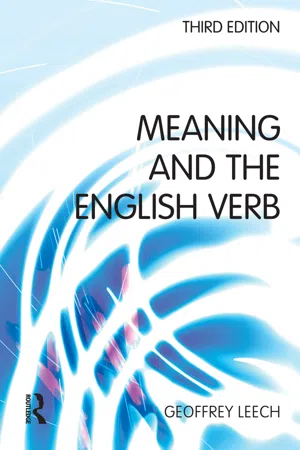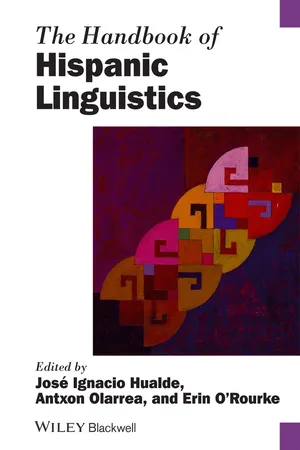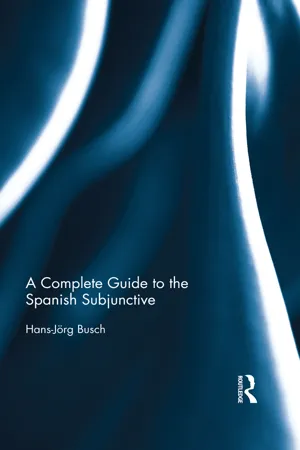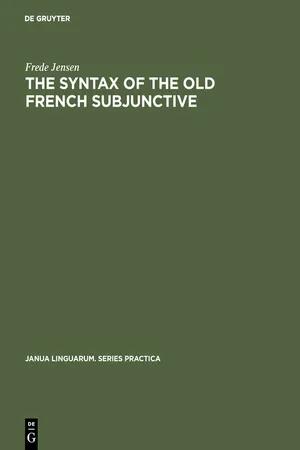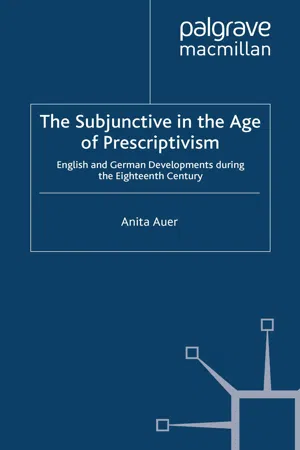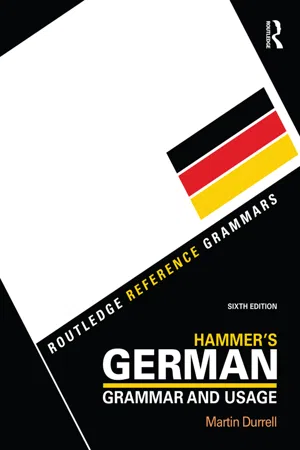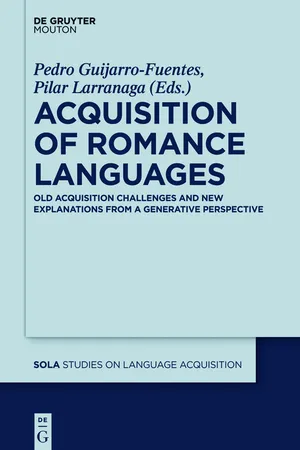Languages & Linguistics
Subjunctive Mood
The subjunctive mood is a grammatical mood used to express hypothetical, unreal, or uncertain situations. It is often used to convey wishes, recommendations, or possibilities. In English, the subjunctive is marked by specific verb forms, such as "were" instead of "was," and is commonly found in clauses following certain expressions like "if," "wish," or "suggest."
Written by Perlego with AI-assistance
Related key terms
1 of 5
10 Key excerpts on "Subjunctive Mood"
- eBook - ePub
- Geoffrey N. Leech(Author)
- 2014(Publication Date)
- Routledge(Publisher)
UNREAL supposition (referring to an imaginary or hypothetical state of affairs). Nowadays the Indicative Mood has become all – important, and the Subjunctive Mood is little more than a footnote in the description of the language.While the contrast between the Subjunctive and Indicative Moods has largely disappeared from present-day English grammar, the distinctions of meaning which Mood used to express are still important within the language. Modern English has a threefold distinction between FACTUAL, THEORETICAL and HYPOTHETICAL meanings, corresponding to the Mood distinctions mentioned above, and in the title of this chapter I use the term ‘mood’ loosely to refer to these meanings.The Subjunctive 162 The Subjunctive Mood survives to a limited degree, in modern English, in both Present Tense and Past Tense forms.It is proposed that the Assembly elect a new Committee. | William insisted that Sarah go to his doctor in Harley Street. | If an Association member be found guilty of misconduct, his membership will be suspended and appropriate dues refunded.Present Subjunctive Mood is here shown by the absence of – s from the third – person singular Present Tense verb, and by the use of be in place of the Indicative am / is / are. Whether it occurs in conditional, concessive, or that clauses, the Present Subjunctive is an indicator of non – factual or THEORETICAL meaning (see §§163 – 4 ). However, it is in that-clauses, illustrated in the first example above, that the Present Subjunctive occurs most. This construction, called the MANDATIVE SUBJUNCTIVE , is more common in AmE than in BrE.The Past Subjunctive, on the other hand, expresses HYPOTHETICAL MEANING . It survives as a form distinct from the ordinary Indicative Past Tense only in the use of were, the Past Tense form of the verb to be, with a singular subject: She looks as if she WERE accusing me of fraud - eBook - ePub
- Ana Fairchild, Juan Mendez(Authors)
- 2011(Publication Date)
- Collins Reference(Publisher)
CHAPTER 4The Subjunctive Mood
T he Subjunctive Mood is a difficult subject to learn for English-speaking students. The difficulty lies in that you can not easily recognize this mood in the English language. The use of the Subjunctive Mood can be easily applied if the concept of the mood is first learned.We must compare and contrast the indicative and the Subjunctive Moods. The indicative mood expresses facts and states objectivity. The actions or events stated or described by the indicative mood can be objectively proven or disproven.Juan estudia mucho.John studies a lot .María y Josefina desean un millón de dólares.Mary and Josephine want a million dollars .Jorge va a la escuela.George goes to school .Ellos no fueron a la conferencia.They did not go to the conference .In all of these sentences, facts are stated about the different individuals. In the first sentence, it is stated that John studies. In the second sentence, Mary and Josephine want money. It is a fact that they feel this way. In the third sentence, a fact is also stated: George goes to school . In the fourth sentence, it is denied that they went to the conference.Unlike the indicative mood, the Subjunctive Mood implies subjectivity. This mood expresses opinion, emotion, desire, feeling, doubt, necessity, request, uncertainty, wish, and other subjective desires that may or may not be true. Normally, the Subjunctive Mood appears in dependent clauses which are introduced by conjunctions or relative pronouns.Juan desea que su hermano estudie.John wants his brother to study .El profesor quiere que sus alumnos obtengan buenas notas.The professor wants his students to obtain good grades .Yo dudo que José hable español.I doubt that Joseph speaks Spanish .In all these sentences, subjective opinions are expressed about different situations. In the first sentence, John wants his brother to study. In the main clause, the indicative mood is used because it is a fact that John feels this way. However, it is not John’s task to see that his brother studies; it is up to his brother to do so. For this reason, the Subjunctive Mood is used in the dependent clause. The same occurs in the second and third sentences. It does not depend on the professor for the students to do well. The students have to do well themselves. The ability to speak a language rests on Joseph, not on the subject of the sentence. - eBook - ePub
- José Ignacio Hualde, Antxon Olarrea, Erin O'Rourke, José Ignacio Hualde, Antxon Olarrea, Erin O'Rourke(Authors)
- 2012(Publication Date)
- Wiley-Blackwell(Publisher)
19
Mood: Indicative vs. Subjunctive
IGNACIO BOSQUE1 Introduction: syntactic contexts for moods
Moods constitute a manifestation of modality. This category reflects the speaker’s attitude towards propositional contents, more specifically the various forms in which statements are interpreted under the influence of semantic environments, whether hypothetical or real. Moods are verbal inflections reflecting modality. They may directly encode grammatical differences related to speech acts, as in the subjunctive form tenga in ¡Tenga un buen día! ‘Have a nice day!,’ as opposed to the indicative tiene in Tiene un buen día ‘S/he is having a nice day.’ In many cases, moods are induced or triggered by various grammatical categories in restricted syntactic contexts, for example the preposition sin ‘without’ in sin que tú lo {supieras/*sabías} ‘without you {knowing-SUBJ./knowing-IND.}.’There exists an abundant theoretical literature on the Spanish verbal moods, written in several frameworks, as well as many traditional and descriptive studies on this topic. Overviews may be found in Lleó (1979), Manteca Alonso-Cortés (1981), Borrego et. al. (1986), Bosque (1990), Porto Dapena (1991), and Ahern (2009), among others. Extensive chapters are devoted to the description of moods in recent grammars of Spanish. See Ridruejo (1999), Pérez Saldanya (1999) and RAE-ASALE (2009: ch. 25). General presentations of the Subjunctive Mood in current theoretical linguistics may be found in Portner (1999), Quer (2005), and Laca (2010). Studies on Spanish moods from pragmatic, functional, or discourse-oriented perspectives include Lunn (1989, 1995), Mejías-Bikandi (1994), Maldonado (1995), Gregory (2001), Haverkate (2002), and Travis (2003). - eBook - ePub
- Hans-Jorg Busch, Hans-Jörg Busch(Authors)
- 2017(Publication Date)
- Routledge(Publisher)
The function or systematic grammatical meaning of the indicative, subjunctive, and imperative moods in SpanishBy defining moods as the formal and systematic manifestations of modality, they are characterized as grammatical structures with a general modal meaning. This meaning cannot be explained in philosophical, semantic or pragmatic terms, but as a notion that corresponds to all the specific systematic manifestation in the language. Neither can it be defined as triggered by the meaning of other elements or just as the product of distribution rules.
The basic mood in Spanish is the indicative. Its verb endings and uses distinguish it from the subjunctive and the imperative.7.1 The formal distinction between indicative and subjunctive in SpanishThe formal distinction between the present indicative and subjunctive is minimal. It is just based on the distinction between the phonemes versus allophones /a/, /e/ and /i/. The same goes for the difference between the imperfect and the imperfect subjunctive (past subjunctive) of regular -ar verbs that are only distinguished by the phonemes [b] and [r]. This is similar to how we use phonemes to distinguish words with different meaning, such as fAn and fUn, bOOt and bOAt, haPPy and HaRRy , etc.Therefore, it is important for teachers to train their students to hear the phonetic difference between [a] and [e] and to point out the importance of this phonological distinction in the Spanish language.The subjunctive paradigm is in many ways more limited and restricted when compared to the indicative:- There are only two simple subjunctive conjugations – if we ignore the differences between the two imperfect subjunctive forms hablara/hablase :1 the present and past subjunctive. However, there are five simple indicative conjugations: the present, preterit, imperfect, future, conditional indicative.2 (We can neglect the analytic forms consisting of haber
- Eduardo D. Faingold(Author)
- 2003(Publication Date)
- Palgrave Macmillan(Publisher)
5.5.2.1 Psychological and semantic constraints on mood development The choice or neutralization of mood distinctions in languages such as Spanish and French is not so much related to surface syntax as to truth values and the speaker’s belief or attitude about the world. The constraints involved in mood development cannot be stated without reference to semantics and psychological (but see Lleó’s [1979] study of the Spanish subjunctive in terms of optional syntactic rules on mood insertion). Below I discuss a few psychological and semantic constraints leading to variation or neutralization of the Spanish subjunctive (see Bull 1965; Goldin 1974; Lakoff 1971; McCawley 1968). 1. Syntactic principles: Very little syntactic knowledge appears to be needed to use the Spanish subjunctive: (a) The subjunctive occurs in complex sentences, which contain two or more verbs with a connector linking the two or more clauses (usually que ‘that’, but also si ‘if, cuando ‘when’, and a few others); (b) the subjunctive verb is located in the subordinate clause – the one following the connector (i.e. on the right of the written form). 2. Psychological and semantic constraints: The choice to use the subjunctive and the neutralization of the Spanish subjunctive are constrained by (a) the speaker’s psychological reactions (e.g. dis- like, surprise, fright, etc.) and (b) semantic presuppositions. (a) Psychological reactions: The main verb can determine that the verb be in the subjunctive; this is the case when the main verb is a reaction verb (e.g. lastima ‘pity’, alegrarse ‘happy’, sentir ‘sorry’, etc.). A reaction is defined as the speaker’s emotional evaluation of a real or imaginary object or situation. Thus, if 88 Grammar in Spanish and Romance Languages the main verb indicates a reaction, the subordinate verb is subjunctive (see e.g., sentence (1)a, in Table 5.7, Me alegro que esté aqui.- eBook - PDF
- Frede Jensen(Author)
- 2017(Publication Date)
- De Gruyter Mouton(Publisher)
The Subjunctive Mood is then caused by the element of uncertainty which is always present in a subjective statement, and the change in mood which takes place in the 16th-17th century reflects an increasing doubt in the validity of affectively colored statements. Classical Latin made use of an accusativus cum infinitivo, but later, a clause with quod was preferred. The mood was normally the indicative, the subjunctive occurring only in connection with indirect discourse. An example from Cicero: Gaudeo quod te interpellaui. 12 1. The Conjunction is QUE a. The mood is the indicative. Roland 716 quel dolor que Ii Franceis nel sevent. Becket 1603 E mult sui jo dolenz que jo ai sa haür. Renart 2760 mout me poise que je sui vive. Griseldis 692 J'ay grant dueil Qu'autrement tu n'y prenz l'avance. Pathelin 828 j'enraige que je n'ay mon argent. Often the main clause contains a reference to the subordinate clause. This reference, which further stresses the objectivity of the idea contained in the ^we-clause, is usually a demonstrative or en. The mood is the indicative : Alexis 477 Ço peiset mei que podrirat en terre. Aucassin IV,10 ce poise moi qu'il i va ne qu'il i vient. Queste 71,24 Et por ce se repent il qu'il ot onques foie amor vers la reine. b. The mood is the subjunctive. The subjunctive after an expression of emotion is extremely rare in the Old French period. The first examples, according to Simon, 13 are from the middle of the 12th cen-tury; they mainly appear in connection with a main clause in the subjunctive or in • Lerch, Die Bedeutung der Modi, 26-30. 10 Lerch, Die Bedeutung der Modi, 26-30. 11 Lerch, Die Bedeutung der Modi, 26-30. 18 Ernout-Thomas, Syntaxe latine, 298. 13 E. Simon, Die Rektion der Ausdrücke der Gemütsbewegung im Französischen, (Göttingen, 1907), 23. THE SUBJUNCTIVE IN THE SUBSTANTIVAL CLAUSE 47 certain writers, above all Wace, who may have undergone a strong learned influence. - eBook - PDF
The Subjunctive in the Age of Prescriptivism
English and German Developments During the Eighteenth Century
- A. Auer, Kenneth A. Loparo, Charles Jones, Charles Jones(Authors)
- 2008(Publication Date)
- Palgrave Macmillan(Publisher)
The semantic aspect Lowth men- tions with regard to the Subjunctive Mood is the conditional. Moreover, examples of the subjunctive imply that it expresses something contin- gent and doubtful whereas the indicative expresses a more absolute and determinate sense (see ibid., p. 141). One aspect missing in Lowth’s account of the subjunctive is a for- mal description of the mood. Information on this aspect can only be inferred from the examples provided, which contain inflectional sub- junctive forms such as thou be, he slay, he wash and it were. As the subjunctive is expressed by modifications of the verb (like the indica- tive and the imperative) rather than by modal auxiliaries, the question should again be raised whether Lowth considered the subjunctive to be a ‘secondary mode’. After all, when Lowth illustrates the conjuga- tion of the verb love, he lists inflectional subjunctive forms as well as modal auxiliaries followed by the infinitive, in the present and past tense (see ibid., pp. 54–55). Lowth adds a footnote, which says the following: 5 Note, that the Imperfect and Perfect Times are here put together. And it is to be observed, that in the Subjunctive Mode, the event Eighteenth-Century English and Subjunctive Mood 35 being spoken of under a condition, or supposition, or in the form of a wish, and therefore as doubtful and contingent, the Verb itself in the Present, and the Auxiliary both of the Present and Past Imperfect Times, often carry with them somewhat of a Future sense: as, “If he come to-morrow, I may speak to him:” – “If he should, or would, come to-morrow, I might, would, could, or should, speak to him.” Observe also, that the Auxiliary should in the Imperfect Times is used to express the Present, as well as the Past; as, “It is my desire, that he should [now] come;” as well as, “It was my desire that he should [then] come.” So that in this Mode the precise Time of the Verb is very much determined by the nature and drift of the Sentence. - eBook - PDF
- Martin Durrell(Author)
- 2016(Publication Date)
- Routledge(Publisher)
14 Mood: the imperative and the subjunctive The grammatical category of MOOD makes it possible for speakers to signal their attitude to what they are saying, in particular to indicate whether what they are saying is to be understood as a fact, a possibility or a command. German has three moods, the IN DICATIVE , the IMPERATIVE and the SUBJUN CTIVE , and these are shown by special verb endings or forms. Table 14.1 shows some typical examples of verb forms in the three moods. TABLE 14.1 The moods of German Indicative Subjunctive Imperative sie ist sie kauft sie kam sie wird wandern sie sei sie kaufe sie käme sie würde wandern sei! kaufe! kommt! wandern Sie! All the forms of the indicative and the imperative in the active voice are given in Tables 10.10– 10.13 , and in the passive in Tables 10.14 and 10.15 . The formation of the subjunctiv e mood is explained in section 10.5 and all the forms are shown in Tables 10.16 – 10.22 . • The indicative mood presents what the speaker is saying as a fact The indicative is the most frequent mood, used in all kinds of statements and in questions – in effect in all contexts where speakers do not want to give a command or to signal that what they are saying may not be the fact. As it is the ‘normal’ or default mood, its use is not treated specifically in this chapter. • The imperative mood is used in commands and requests As we normally address these to the person we are talking to, the imperative mood only has special forms in the second person (i.e. the ‘you’-form). The uses of the imperative in German are treated in section 14.1 , together with the other ways of giving commands and requests. • The Subjunctive Mood presents what the speaker is saying as not necessarily true If we use the subjunctive , we are characterizing an activity, an event or a state as unreal , possible or, at best, not necessarily true (hence its old German name of Möglichkeitsform ). - eBook - PDF
Grounding
The Epistemic Footing of Deixis and Reference
- Frank Brisard(Author)
- 2012(Publication Date)
- De Gruyter Mouton(Publisher)
The meaning and distribution of French mood inflections Michel Achard 1. Introduction In Cognitive Grammar (CG), grounding predications specify the rela-tion that exists between a conceptualized entity and the speech situa-tion or ground, namely the speech act participants (speaker and hearer), and the immediate circumstances of the utterance. In the case of a clause, these predications evaluate the epistemic status of the event the clause designates. In French, the grammatical tools that allow conceptualizes to ad-dress the epistemic status of events include markers of person, tense, and mood, often grouped together into a single verbal ending. The goal of this paper is to investigate the meaning and distribution of the indicative, subjunctive, and conditional inflections. 1 Mood selection is determined by the evaluation of the status of the conceptualized event with respect to reality. The presence of the indicative inflection indicates that the event is reported as a proposition, that is to say that it includes a putative address in reality. The conditional inflection indicates that the event is construed as an alternative to reality. Fi-nally, the subjunctive inflection indicates that the conceptualized event is not considered with respect to reality, but to a specific, more local mental space. The paper is organized in the following fashion. Section two in-troduces the basic notions about grounding that will be required throughout the analysis. Section three describes the French mood sys-tem. Section four presents the semantic import of the indicative, con-ditional, and subjunctive inflections. Section five examines the distri-bution of these inflections in the context of the negative propositional 198 Michel Achard attitude verb penser 'think'. Section six summarizes the results and concludes the paper. - eBook - PDF
Acquisition of Romance Languages
Old Acquisition Challenges and New Explanations from a Generative Perspective
- Pedro Guijarro-Fuentes, Maria Juan-Garau, Pilar Larrañaga, Pedro Guijarro-Fuentes, Maria Juan-Garau, Pilar Larrañaga(Authors)
- 2016(Publication Date)
- De Gruyter Mouton(Publisher)
expected responses with even less frequency than the non-native groups. Unlike L2 learners, natives did not usually choose ungrammatical distractors, but options that could be possible if speci fi c contextual hypotheses were accessed, even though the contextualisation of the items did not bring them up. Two of the items in the fi rst task, at least, suggested that native speaker variability (unlike non-native variability) was mainly due to diverging pragmatic enrich-ment processes. This hypothesis was con fi rmed in the metalinguistic task, in which native speakers gave considerably di ff erent accounts of the interpretive variations linked to mood alternation in the pairs of utterances; such variation proved the rich array of contextual assumptions that our informants were able to contemplate. However, a strong preference for irrealis interpretations was perceived over-all. As shown in Section 2.1, the Subjunctive Mood is frequently related to the expression of potentiality or possibility. Such frequency may be due to, or be the origin of, a default interpretation of this mood: native Spanish users could have a tendency to fi rst access irrealis interpretations, and try other possibilities only if strong contextual assumptions are contradictory with these readings. A possible explanation for this is that L1 Spanish speakers may possess a folk theory of the Subjunctive Mood, consisting in an awareness of its connection to irrealis modality, which is what the participants verbalised in the task. Still, our results are not conclusive on this issue, and the seeming irrealis bias could be an e ff ect of the task design, and actually just re fl ect the speakers ’ relative inability to clearly verbalise other types of interpretation. Indeed, many instances of such a phenomenon have been found in our data.
Index pages curate the most relevant extracts from our library of academic textbooks. They’ve been created using an in-house natural language model (NLM), each adding context and meaning to key research topics.
